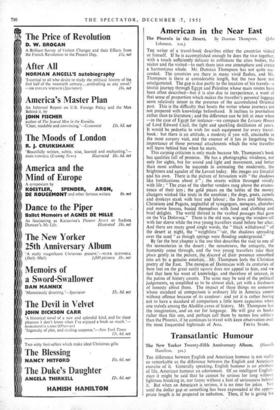American in the Near East
The Phoenix in the .Desert. By Dunstan Thompson. (John Lehmann. 2 Is.) THE writer of a- travel-book describes either the countries visited or himself. If he is accomplished enough he does the two together, with a touch sufficiently delicate to sublimate the alien bodies, the visitor and the visited—to melt them into one atmosphere and create a harmonious whole. Mr. Dunstan Thompson has not quite suc- ceeded. The countries are there in many vivid flashes, and Mr. Thompson is there at considerable length, but the two have -not amalgamated. The gap is due partly to the location of his travels—a tourist journey through Egypt and Palestine whose main routes have been often described—but it is also due to inexperience, a want of that sense of proportion which makes the traveller's-personal luggage seem relatively minor in the presence of the accumulated Oriental past. This is the difficulty that besets the writer whose journeys are not prepared with knowledge beforehand. It inclines to journalism rather than to literature ; and the difference can be felt at once when —in the case of Egypt for instance—we compare the Leisure Hours of Lord Edward Cecil, the light and sparkling distillation of years. It would be pedantic, to wish for such equipment for every travel- book : but there is an attitude, a modesty if you will, attainable in the most cursory visit, and the essence of it lies in forgetting the importance of those personal attachments which the wise traveller will leave behind him when he starts.
This carping criticism is only made because Mr. Thompson's book has qualities full orpromise. He has a photographic vividness, not only for sights, but for sound and light and movement, and better than most authors he succeeds in animating the modernity, the brightness and squalor of the Levant today. His images are forceful and his own. There is the picture of Jerusalem with "the shadows like fortifications about it " ; the streets within thronged vividly with life ; "The cries of the sherbet vendors rang above the evanes- cence of their ices ; the gold pieces on the tables of the money changers winked like touts in the sunshine ; the dogs, goats, camels and donkeys stank with heat and labour ; the Jews and Moslems, Christians and Pagans, neglectful of synagogues, mosques, churches and movie houses, busied themselves with food and clothing and brief delights. The world thrived in the vaulted passages that gave on the Via Dolorosa." There is the old nun, wiping the window-sill with her sleeve while the two young travellers stand before her altar. And there are many good single words, the "black withdrawal" of the desert at night, the "weightless "air, the shadows spreading over the sand "as though springs were flooding underground."
By far the best chapter is the one that describes the visit to one of the monasteries in the desert ; the remoteness, the antiquity, the humanity come through, and the two young travellers take their place gently in the picture, the discord of their presence smoothed into art by a genuine emotion. Mr. Thompson feels the Christian poetry_ of the East: The mosqUer9I Damascus with its centuries of bare feet on the great sunlit square does not appeal to him, and we feel that here his want of knowledge, and-therefore of interest, in the patina of history counts. The same may be said of the political judgements, so simplified as to be almost slick, yet with a freshness of honesty abbut them. The impact of these things on someone whose standard of cOmparison is ordinary life in America comes without offence because of its candour: and yet it is rather boring not to have a standard of comparison a little more capacious when one traVels among the Aladdin caves of history. Mr. Thompson has the imagination, ands' an ear for language. He will give us books richer than this one, and perhaps call them by names less solitary than the Phoenix, if he continues to travel with keen observation over
the most frequented highroads of Asia. FREYA STARK.


















































 Previous page
Previous page